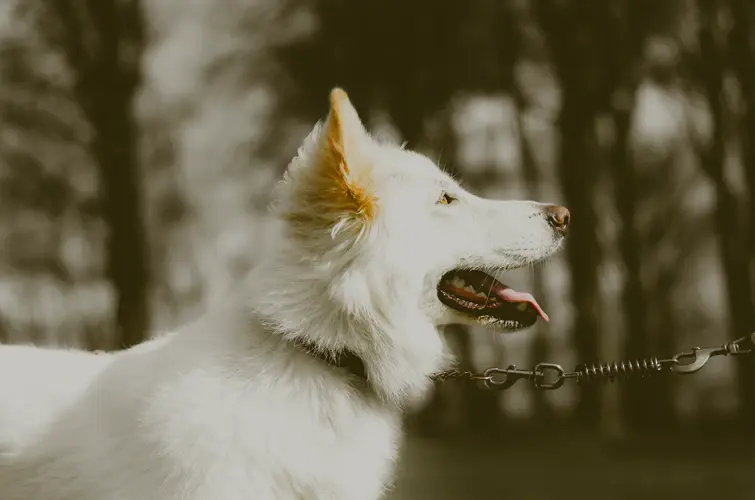Can Dogs Eat Pears? When Can Dogs Not Eat Pears?
Pears are frequently consumed today because of their many health benefits.
Pears are rich in natural sugars that can be beneficial for both humans and dogs.
If you have a dog at home, this is just one of the signs that you are a good person.
You have to be careful about what your dog eats and drinks because malnutrition will not do well for your dog.
Take your time and take care to read our entire article because this article will guide you to protect your dog from dangerous, risky diseases.
After reading the article, we strongly recommend that you read our “Can Dogs Look Up” article.

What Will We Learn?
Can Dogs Eat Pears?
Yes. It is beneficial to give the pear to your dog after cleaning the seeds, stem, root.
This applies to all fruits, not just pears, because fruit seeds contain chemicals that are deadly to dogs (the most dangerous being cyanide).
On top of that, if your dog swallows a pear stem, it can get stuck in their intestines, which in most cases requires surgical removal.
As for the pear peel, you should do your best to feed it to your dog because the pear peel is really beneficial for it.
Before giving the pear slices to your dog, make sure that you wash the pear very well so that your dog does not eat the residues of agricultural chemicals.
Now that we have counted all the dangers that may occur when you give a pear to a dog without washing, it is time to talk about how we should give it to eat. The best way to feed a pear to your dog is to slice it.
If your dog accidentally swallows one or two seeds, don’t panic because he must have swallowed a lot more than that for it to become poisoned, even more than he could eat. Yes, do not panic, but if possible, prevent him from eating other seeds.
Finally, you may be paying attention, but believe me, many people don’t care, so I feel the need to write it again.
Never give your dog a rotten pear.
Rotten pears (just like any other rotten fruit) cause serious stomach aches and problems.
Therefore, make sure that the pear you give your dog is fresh.
How Many Pears Should Dogs Eat?
As with all human foods, it is okay for dogs to eat pears as long as they are given under supervision and in a controlled manner.
Ideally, instead of giving a whole pear to your dog at once (it can cause stomach ache), slice it and give it 1-2 slices at a time, up to 3 times a day.
Giving your dog too many pears will also cause stomach upsets, vomiting and diarrhea.
As long as you give your dog pear in moderation, there is no problem, but you should focus on a quality dog food for your dog’s nutrition.
Always note and record the size of the food you give your dog.
Except for dog food, all other food you will give your dog should not exceed 5% of the daily feeding schedule.

Do Dogs Eat Beans?
Beans are often used in some dog food recipes, so you can assume that dogs can eat beans.
However, not all varieties are safe to consume.
Read on to learn how dogs can safely eat beans as part of a healthy diet, and what benefits – or risks – there can be to feeding these vegetables.
Yes, dogs can safely eat some types of beans.
However, not every type of bean edible for humans is safe for dogs to consume.
It’s always best to check that the vegetables you want to offer your dogs are safe for them.
Types of beans that are safe for dogs to eat are packed with certain nutrients like protein and fiber, making them a satisfying and healthy snack.
If you have a cat at home, you should read our article How to deworm a cat.
What Types of Beans Can Dogs Eat?
There are several bean varieties that are safe for your dog to try. These include:
- Cooked kidney beans
- Lima beans
- Black beans
- Kidney bean
- Chickpeas
- Navy bean
- Cannellini beans
- Soy and edamame beans
- Green beans
If you want to know what cats like for breakfast, you can read this article.

Foods We Recommend Your Dogs Eat
Before going into details about the vegetables and fruits that dogs can eat, we would like to give a brief information.
Dogs are classified as carnivores.
From this point of view, it can be concluded that they do not need to eat vegetables and fruits.
However, this issue is highly controversial.
By examining the anatomical features of dogs (molars, carbohydrate digestion rates and small intestines, etc.), experts argue that dogs are both carnivorous and herbivorous, that is, omnivorous animals.
For this reason, dogs can be given vegetables or fruits, but it is important to consult veterinarians before making this decision.
Apple
Although apples are rich in vitamins A and C, they are a useful fiber source for dogs. It is also considered a healthy snack for older dogs, as it is very low in protein and fat. Before giving apples to dogs, the seeds must be removed.
Banana
Bananas are among the fruits that dogs can eat.
Bananas, which can be considered both a healthy and low-calorie treat for dogs if given in moderation, contain potassium, fiber, copper and various vitamins.
It is useful to give it carefully because the sugar content is high.
Blueberries
Dogs can consume blueberries.
This fruit, which is very rich in antioxidants that prevent cell damage in both humans and dogs, will be beneficial when served to dogs at regular intervals with its fiber ratio.
Watermelon and Melon
“Do dogs eat watermelon on hot summer days?” The answers to the question are curious, the good news is that dogs can eat both watermelon and melon.
These fruits, which should be given after the seeds are removed, contain many vitamins.
However, it should not be forgotten that sugar rates are high! As with any other fruit, veterinary approval is essential.
Pear
Dogs can eat pears. This fruit is a great snack in terms of copper, vitamin C, vitamin K and fiber. When giving a pear, the core must be removed.
In addition to all these, it can be stated that dogs can eat fruits such as mango, strawberry, orange, peach, cranberry.
At this point, it is important to note that fruits should be given in a measured amount and these recommendations may vary according to the general health status of the dogs.
The most precise information about whether the selected fruit is safe for dogs should be obtained from veterinarians.
Among the fruits that dogs should not eat are CHERRY, AVOCADO, GRAPE and TOMATO.
Result
Consumption of a large amount of pear will not be beneficial for dogs.
It will be beneficial for your dog to cut the pear into small pieces and give it to your dog.
Giving small amounts of pears occasionally will not affect your dog’s health.
Pears are high in sugar and can cause obesity and stomach upsets in your dogs when consumed in excess.
Pears are high in sugar and when consumed in excess can cause weight gain and upset stomachs in your dogs.
If you are considering giving pears to your dog, be sure to give them fresh, ripe pears.
Avoid giving your dog a whole pear as this can pose a choking hazard to your dog.
Are Pears Good For Dogs now? We have come to the end of our article.
If you like our article, we will be happy if you leave a comment.
